Why do pepper ovaries fall and what to do to save the beds
Growing peppers on the site is a task that requires patience and attention. One of the frequent problems that gardeners face is the falling off of the ovaries after flowering. This happens for a number of reasons - from non-observance of agrotechnical practices to adverse weather conditions. Let's consider these reasons and how to eliminate them.
The content of the article
Why do peppers fall off ovaries
Culture is demanding to care... At the first signs of falling of fruit ovaries, first of all, find out the reason.
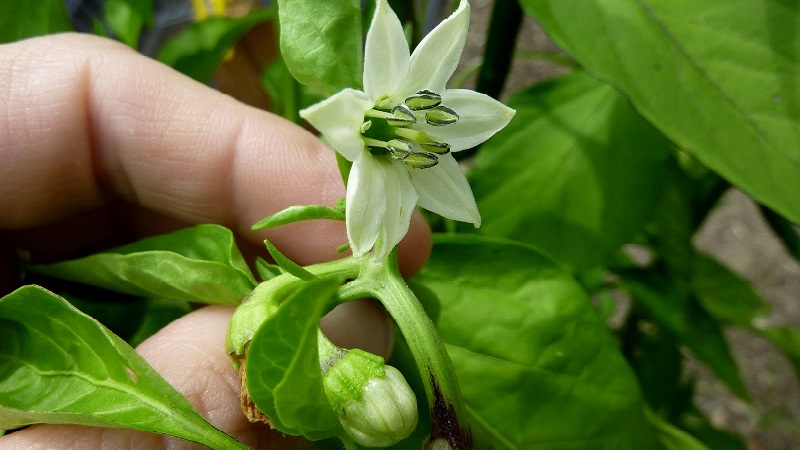
Lack of light
The ideal length of daylight for the growth and development of peppers is 12 hours... Lack of lighting negatively affects the plants - in such conditions, the seedlings poorly absorb nutrients and grow weak.
If there is still enough strength for flowering, then further development is inhibited. Weak flowers fall, no ovaries are formed.
Lack of moisture
The root system of peppers is almost entirely in the upper layers of the soiltherefore the slightest lack of moisture negatively affects the whole plant. The soil should be sufficiently moist, especially during the period of ovary formation and fruiting. Otherwise, the receipt of nutrients and the further development of culture are stopped. The already formed ovaries fall off.
Important! Excess water is no less a threat to the plant than lack of it. Excess moisture provokes the appearance of rot and various diseases.
Dry air
A common cause of ovary dropping is inappropriate humidity. For peppers, indicators are from 60% to 80%... In dry air, it is more difficult for plants to assimilate nutrients, they dry out and do not form fruits.
Poor soil composition
The natural mechanism of self-preservation forces plants to discard the formed flowers and ovaries during periods of danger and stress.
Nutritional deficiencies pose a threat to culture, which disrupts metabolic processes and reduces immunity. This is due to the lack of nitrogen, phosphorus, potassium and other elements in the soil. They contribute to the formation, development and ripening of fruits, and their absence causes real stress in peppers. As a result, leaves turn yellow and fall, shoots wither, ovaries die.
Key recommendations for replenishment of important substances:
- in light and sandy soil, peppers lack potassium, iodine, magnesium and bromine;
- if the soil is limed, the plants lack manganese, zinc and boron;
- in peat soil, vegetables are deficient in potassium, copper and manganese.
Pollination problems
Such a problem often occurs in an unventilated greenhouse... In plants, flowers are bisexual, so a slight movement of air is enough for pollination. If this does not happen, the flowers fall off.
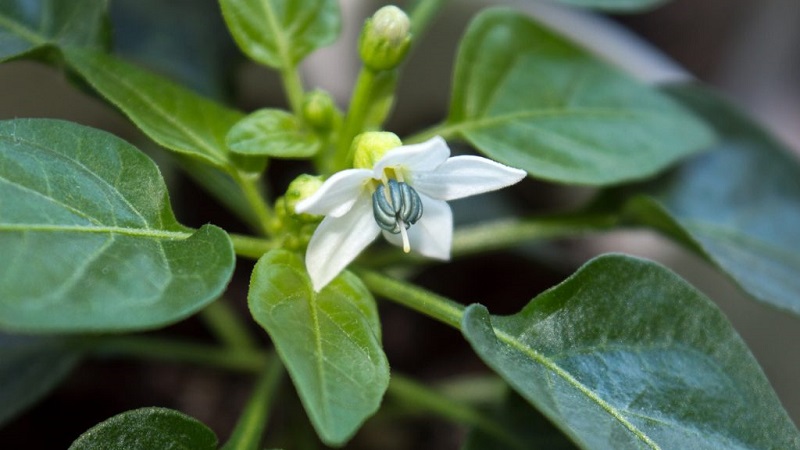
Planting density
In the struggle for the harvest, greed will not be an assistant. Peppers cannot be planted close to each other - this will no longer cause vegetables. Dense planting will lead to the struggle of plants for light, water and nutrients... In such harsh conditions, not all bushes will receive the nutrition necessary for development, which will lead to the death of the ovaries.
Attention! 3–6 peppers are placed on 1 m² of land, depending on the size of the bushes. This will create favorable conditions for air circulation and prevent plant competition.
Temperature changes
Unstable temperature readings adversely affect on the reproductive ability of vegetable crops.They reduce the adaptation of plants, disrupt flowering and fruit formation. Values acceptable for seedlings are + 20 ... + 22 ° С, for adult peppers - + 15 ... + 18 ° С.
But not only cold snaps have a detrimental effect on the vegetable. An increase in temperature to + 35 ° С also leads to dropping of ovaries and death of plants.
Diseases and pests
Weaken seedlings and already formed attack plants pests and illness... If all the forces of culture go to the fight against bacteria, fungi and insects, reproduction is impossible, and for self-defense the bushes get rid of the inflorescences.
Common pests of peppers:
- Whiteflies Are small white butterflies that lay eggs on the underside of leaves. The larvae that appear suck the plant juices, the bushes wither.
- Spider mites - microscopic arachnids, the presence of which is indicated by small dots on the stems and leaves of peppers and cobwebs. Mites feed on the sap of plants - they wither, turn yellow and die.
- Nematodes... These roundworms live in the earth and damage the root system of peppers. In affected bushes, yellow-brown thickenings are visible on the roots.
- Medvedki - large, up to 6–8 cm, insects dig labyrinths around plantings, damaging the roots of vegetables, causing wilting and death of bushes.
- Garden ants feed on honeydew secreted aphids, thereby increasing the number of the latter. The result is damaged plants, the risk of disease.
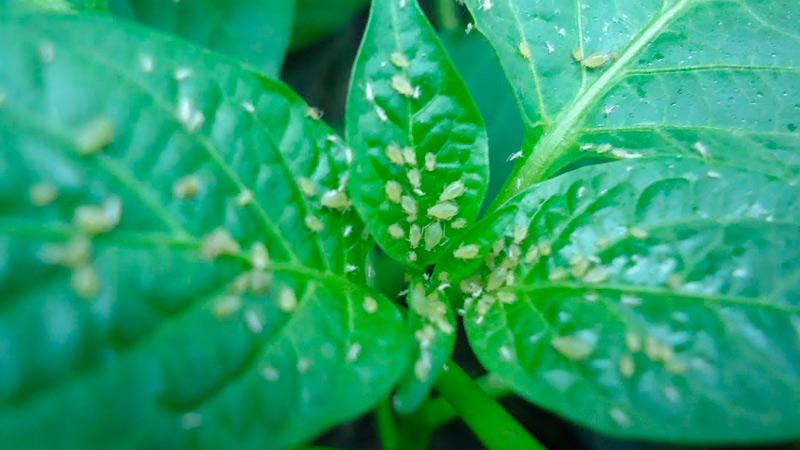
Dangerous diseases of culture:
- Bacterial spot... Small oily spots of olive color appear on the leaves, which gradually turn black and grow throughout the bush. Leaves and ovaries fall off, fruits do not ripen.
- Late blight - a fungal disease in which the plant is covered with brown spots, starting with leaves and ending with peppers.
- Verticillosis... The leaf plates turn pale and deformed, the bushes dry out, the fruits become very shallow or do not set.
Why do ovaries, flowers, peppers fall
Exist several reasons prompting the bushes to get rid of their own flowers, ovaries and fruits... They are conventionally divided into agrotechnical errors and climatic conditions.
The main vagaries of the weather:
- Prolonged heat... Peppers feel good even at + 20 ... + 30 ° C, but long-term elevated temperature, dry air and soil will force the vegetables to throw off the ovaries.
- Overcast weather... The lack of sun and heat makes the bushes weak and susceptible to disease. All forces will be spent on survival, and flowering and fruiting will be postponed.
- Sudden changes in temperature... Rapid temperature changes during the day provide plants with severe stress. In self-defense, they eliminate flowers and ovaries.
Growing errors:
- Improper watering... It is important not only to give the roots enough moisture, but also not to flood them.
- Invalid schedule top dressing... An excess of fertilizers, in particular nitrogen, leads to the build-up of a powerful green mass, which will not bear fruit.
- Permanently closed greenhouse... The room is periodically opened for ventilation. Heat and stuffiness provoke the development of diseases and decay; in a closed greenhouse, flowers are not pollinated.
- Lack of prevention pests and diseases. Failure to comply with preventive measures leads to loss of yield, since the plants will spend energy fighting for survival, and not fruiting.
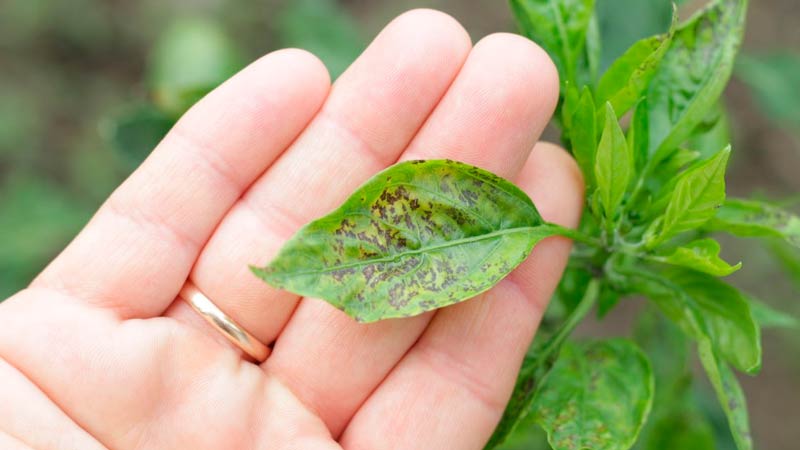
Causes in the greenhouse and open field
In the greenhouse, special attention is paid to humidity level. If it is above 80%, the room is ventilated. It is stagnant air that is often the main cause of ovary falling off.
Outdoors the main problem - temperature changes. They stress the plants, slow down their growth and lead to the shedding of flowers and already set fruits.
A strong wind carries pests and pathogens to crops. Both those and others weaken the peppers, make them incapable of fruiting.
It can be useful:
Why pinch pepper and how to do it
What to do
To stop the ovaries from falling off, it is important:
- provide 12-hour lighting and heat level within + 18 ... + 30 ° C;
- create an optimal planting density using a checkerboard method: according to the scheme 30 × 30 cm for low-growing varieties and 40 × 60 cm for tall spreading peppers;
- observe the feeding regime: alternate organic and mineral fertilizers after 2 weeks (during the period of growth and the beginning of flowering, nitrogen compositions are chosen, during the formation and ripening of fruits - potash and phosphorus);
- in the heat, shade the plantings, and ventilate the greenhouses;
- water the bushes abundantly at least once a week, followed by loosening and mulching the soil;
- to maintain moisture in the open field, moisten the paths between the beds daily;
- use folk methods for pest control: spray plants with infusions of grated laundry soap, garlic, chamomile or yarrow;
- help the pepper by transferring pollen from one plant to another with a cotton swab or brush, or by gently shaking the bush.
Pollination is carried out in the morning at a temperature of + 23 ... + 25 ° C... The pollen will become unviable if the air is heated above + 30 ° C.
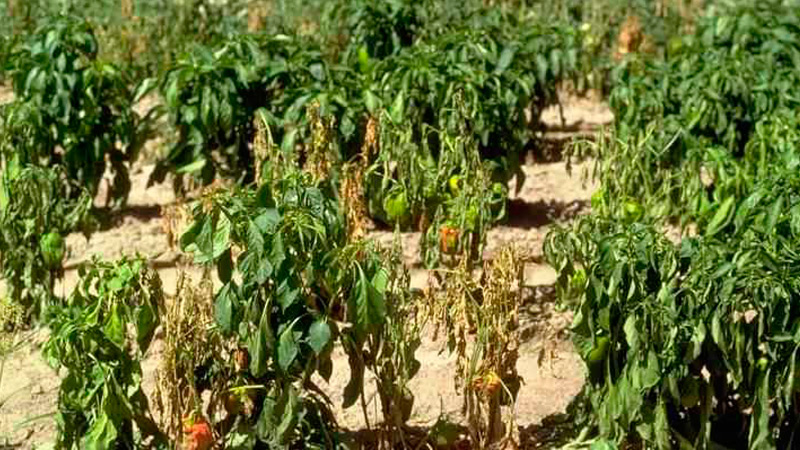
Insecticides are used in advanced cases to combat:
- whiteflies - "Confidor", "Fufanon";
- spider mite - "Inta-Vir", "Karbofos";
- Bears - "Medvetoks", "Grizzly";
- ants - "Muravyin", "Thunder-2".
Fighting nematodes is hard... The soil where they are located is replaced with a new one, the rules of crop rotation are observed, all tools are disinfected.
Against bacterial spotting, plantings are sprayed "Fitosporin-M", against late blight - "Oxyhom", "Gamair", copper sulfate. To combat verticillium use "Previkur", "Maxim".
Preventive measures
The best way to avoid mistakes is not to make them. Prevention warns possible problems... They start by cleaning the site or greenhouse, disinfect the soil with a solution of potassium permanganate (5 g per bucket of water). This will destroy bacteria, get rid of pests, and stimulate biological processes. In the spring, before planting plants, the earth is dug up with humus, complex mineral fertilizers.
After planting, the peppers are fed once every 2 weeks, alternating mineral and organic fertilizers.
Monitor air and soil moistureinspecting foliage and stems for pests and signs of disease.
Conclusion
For a beginner, cultivating peppers is fraught with difficulties. It will take patience and adherence to agricultural techniques. Mass discharge of the formed ovaries leads to the death of the entire crop.
So that the work is not in vain, vegetables are provided with suitable growing conditions, their needs for nutrition, temperature, lighting and humidity are met.